 acing the United States Capitol in Washington, D.C.
stands the Jefferson Building, the main building of the Library of Congress, the world's largest library,
with holdings of more than
140 million books and other printed items. The stately building, with its neoclassical exterior,
copper-plated dome and marble halls, is named after Thomas Jefferson, one of the "founding
fathers" of the United States, principal author of the 1776 Declaration of Independence and,
from 1801 to 1809, the third president of
the young republic. But the name also
recognizes Jefferson's role as a founder
of the Library itself. As president, he
enshrined the institution in law and, in
1814, after a fire set by British troops during
the Anglo-American War destroyed
the Library's 3000-volume collection, he
offered all or part of his own wide-ranging
book collection as a replacement for the
losses, commenting that "there is in fact no
subject to which a member of Congress
may not have occasion to refer."
acing the United States Capitol in Washington, D.C.
stands the Jefferson Building, the main building of the Library of Congress, the world's largest library,
with holdings of more than
140 million books and other printed items. The stately building, with its neoclassical exterior,
copper-plated dome and marble halls, is named after Thomas Jefferson, one of the "founding
fathers" of the United States, principal author of the 1776 Declaration of Independence and,
from 1801 to 1809, the third president of
the young republic. But the name also
recognizes Jefferson's role as a founder
of the Library itself. As president, he
enshrined the institution in law and, in
1814, after a fire set by British troops during
the Anglo-American War destroyed
the Library's 3000-volume collection, he
offered all or part of his own wide-ranging
book collection as a replacement for the
losses, commenting that "there is in fact no
subject to which a member of Congress
may not have occasion to refer."
Among the nearly 6500 books Jefferson
sold to the Library was a two-volume
English translation of the Qur'an, the book
Muslims recite, study and revere as the
revealed word of God. The presence
of this Qur'an, first in Jefferson's private
library and later in the Library of Congress,
prompts the questions why Jefferson
purchased this book, what use he made
of it, and why he included it in his young
nation's repository of knowledge.
These questions are all the more pertinent
in light of assertions by some present-
day commentators that Jefferson
purchased his Qur'an in the 1780's in
response to conflict between the us and the
"Barbary states" of North Africa—today
Morocco, Algeria, Tunisia and Libya. That
was a conflict Jefferson followed closely—
indeed, in 1786, he helped negotiate a treaty
with Morocco, the United States' first treaty
with a foreign power. Then, it was relations
with Algeria that were the most nettlesome,
as its ruler demanded the payment of tribute
in return for ending semiofficial piracy
of American merchant shipping. Jefferson
staunchly opposed tribute payment. In
this context, such popular accounts claim,
Jefferson was studying the Qur'an to better
understand these adversaries, in keeping
with the adage "know thy enemy." However,
when we look more closely at the place of
this copy of the Qur'an in Jefferson's
library—and in his thinking—
and when we examine
the context of this
particular translation,
we see a different story.
 rom his youth,
Thomas Jefferson
read and collected
a great number of
books, and a wide variety
of them: The collection
he eventually sold to
the Library of Congress
comprised 6487 volumes,
ranging in subject from
classical philosophy to cooking. Like many
collectors of the time, Jefferson not only cataloged
his books but also marked them. It is
his singular way of marking his books that
makes it possible to establish that, among
the millions of volumes in today's Library of
Congress, this one specific Qur'an did indeed
belong to him.
rom his youth,
Thomas Jefferson
read and collected
a great number of
books, and a wide variety
of them: The collection
he eventually sold to
the Library of Congress
comprised 6487 volumes,
ranging in subject from
classical philosophy to cooking. Like many
collectors of the time, Jefferson not only cataloged
his books but also marked them. It is
his singular way of marking his books that
makes it possible to establish that, among
the millions of volumes in today's Library of
Congress, this one specific Qur'an did indeed
belong to him.
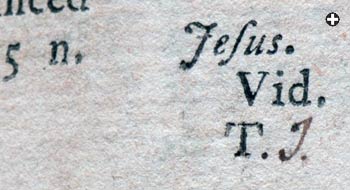 |
| The initials "T.J." were Thomas Jefferson's
device for marking his books: On this
page, the "T." is the printer's mark to help
the binder keep each 16-page "gathering"
in sequence, and the "J." was added
personally by Jefferson. |
In the 18th century, the production of
books was still an essentially manual process.
By means of a hand press, large sheets
of paper were printed on both sides with
multiple pages before being folded. They
were folded once to produce four pages for
the folio size, twice to produce eight pages
for the quarto or four times to produce the
16-page octavo. These folded sheets, known
as "gatherings," were then sewn together
along their inner edges before being attached
to the binding. To ensure that the bookbinders
would stitch the gatherings together in
the correct sequence, each was marked with
a different letter of the alphabet on what,
after folding, would become that gathering's
first page.
Thus, in an octavo volume like Jefferson's
Qur'an, there is a small printed letter in
the bottom right-hand corner of every 16th
page. It was Jefferson's habit to take advantage
of these preexisting marks to discreetly
inscribe each of his books. On each book's
10th gathering, in front of the printer's mark
J he wrote a letter T, and on the 20th gathering,
to the printed T he added a J, thereby in
each case producing his initials. This subtle
yet unmistakable signature appears clearly
on the two leather-bound volumes in the
Library of Congress.
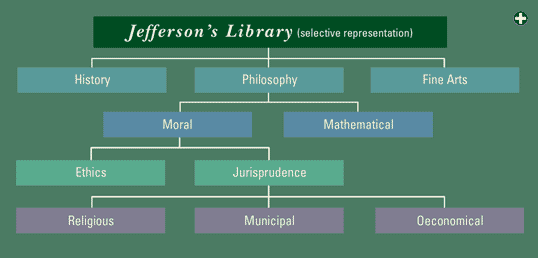 |
Jefferson's system of cataloging his library
sheds light on the place the Qur'an held in
his thinking. Jefferson's 44-category classification
scheme was much informed by the
work of Francis Bacon (1561–1626), whose
professional trajectory from lawyer to statesman
to philosopher roughly prefigures Jefferson's
own career. According to Bacon,
the human mind comprises three faculties:
memory, reason and imagination. This
trinity is reflected in
Jefferson's library, which
he organized into history,
philosophy and fine
arts. Each of these contained
subcategories:
philosophy, for instance,
was divided into moral
and mathematical; continuing
along the former
branch leads to
the subdivision of ethics
and jurisprudence,
which itself was further
segmented into the
categories of religious,
municipal and "oeconomical."
Jefferson's system for organizing his
library has often been described as a "blueprint
of his own mind." Jefferson kept his
Qur'an in the section on religion, located
between a book on the myths and gods of
antiquity and a copy of the Old Testament.
It is illuminating to note that Jefferson
did not class religious works with books
on history or ethics—as might perhaps be
expected—but that he regarded their proper
place to be within jurisprudence.
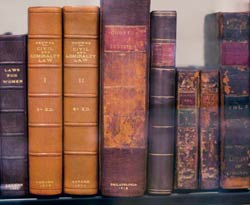 |
| Jefferson organized his
own library, and he
shelved religious books,
including his English
version of the Qur'an,
with other works under
"Jurisprudence," which
fell under "Moral
Philosophy." |
The story of Jefferson's purchase of the
Qur'an helps to explain this classification.
Sifting through the records of the Virginia
Gazette, through which Jefferson ordered
many of his books, the scholar Frank Dewey
discovered that Jefferson bought this copy of
the Qur'an around 1765, when he was still a
student of law at the College of William &
Mary in Virginia. This quickly refutes the
notion that Jefferson's interest in Islam came
in response to the Barbary threat to shipping.
Instead, it situates his interest in the Qur'an
in the context of his legal studies—a conclusion
that is consistent with his shelving of it
in the section on jurisprudence.
Jefferson's legal interest in the Qur'an was
not without precedent. There is of course
the entire Islamic juridical tradition of religious
law (Shari'ah) based on Qur'anic exegesis,
but Jefferson had an example at hand that
was closer to his own tradition: The standard
work on comparative law during his time was
Of the Law of Nature and Nations, written by
the German scholar Samuel von Pufendorf
and first published in 1672. As Dewey shows,
Jefferson studied Pufendorf's treatise intensively
and, in his own legal writings, cited it
more frequently than any other text. Pufendorf's
book contains numerous references
to Islam and to the Qur'an. Although many
of these were disparaging—typical for European
works of the period—on other occasions
Pufendorf cited Qur'anic legal precedents
approvingly, including the Qur'an's emphasis
on promoting moral behavior, its proscription
of games of chance and its admonition
to make peace between warring countries.
As Kevin Hayes, another eminent Jefferson
scholar, writes: "Wanting to broaden his legal
studies as much as possible,
Jefferson found the
Qur'an well worth his
attention."
In his reading of the
Qur'an as a law book,
Jefferson was aided by a
relatively new English
translation that was not
only technically superior
to earlier attempts, but also produced with a
sensitivity that was not unlike Jefferson's own
emerging attitudes. Entitled The Koran; commonly
called the Alcoran of Mohammed, it was
prepared by the Englishman George Sale and
published in 1734 in
London. A second
edition was printed
in 1764, and it was
this edition that Jefferson
bought. Like
Jefferson, Sale was a
lawyer, although his
heart lay in oriental
scholarship. In the
preface to his translation,
he lamented
that the work "was
carried on at leisure
time only, and
amidst the necessary
avocations of a troublesome
profession."
This preface also
informed the reader
of Sale's motives:
"If the religious and
civil Institutions of
foreign nations are
worth our knowledge,
those of
Mohammed, the
lawgiver of the Arabians,
and founder of
an empire which in
less than a century spread itself over a greater
part of the world than the Romans were ever
masters of, must needs be so." Like Pufendorf,
Sale stressed Muhammad's role as a "lawgiver"
and the Qur'an as an example of a distinct
legal tradition.
This is not to say that Sale's translation is
free of the kind of prejudices against Muslims
that characterize most European works on
Islam of this period. However, Sale did not
stoop to the kinds of affronts that tend to fill
the pages of earlier such attempts at translation.
To the contrary, Sale felt himself obliged
to treat "with common decency, and even to
approve such particulars as seemed to me to
deserve approbation." In keeping with this
commitment, Sale described the Prophet
of Islam as "richly furnished with personal
endowments, beautiful in person, of a subtle
wit, agreeable behaviour, shewing liberality
to the poor, courtesy to every one, fortitude
against his enemies, and, above all, a high
reverence for the name of God." This portrayal
is markedly different from those of earlier
translators, whose primary motive was to
assert the superiority of Christianity.
In addition to the relative liberality of
Sale's approach, he also surpassed earlier
writers in the quality of his translation. Previous
English versions of the Qur'an were not
based on the original Arabic, but rather on
Latin or French versions, a process that layered
fresh mistakes upon the errors of
their sources. Sale, by contrast, worked
from the Arabic text. It was not true,
as Voltaire claimed in his famous Dictionnaire
philosophique of 1764, that le savant Sale had acquired his
Arabic skills by having lived for 25 years among Arabs; rather, Sale
had learnt the language through his involvement in preparing
an Arabic translation of the New Testament to
be used by Syrian Christians, a project
that was underwritten by the Society for the Promotion
of Christian Knowledge in London. Studying
alongside Arab scholars who had come
to London to assist in this work, he acquired
within a few years such good command of the
language that he was able to serve as a proofreader
of the Arabic text.
It is thus not so surprising that Sale
turned from translating the holy text of
Christians into Arabic to rendering the holy text of Muslims into his
native English. Noting the
absence of a reliable English
translation, he aimed
to provide a "more genuine
idea of the original."
Lest his readers be unduly
daunted, he justified his
choice of fidelity to the
original by stating that "we
must not expect to read a
version of so extraordinary
a book with the same ease
and pleasure as a modern
composition." Indeed, even
though Sale's English may
appear overwrought today,
there is no denying that he
strove to convey some of
the beauty and poetry of
the original Arabic.
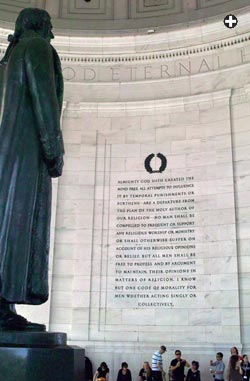 |
|
An inscription inside the
Jefferson Memorial in
Washington, D.C. quotes
Jefferson's 1777 statute on
religious pluralism that
inspired the constitutional
right that "no religious
Test shall ever be required
as a Qualification to any
Office or public Trust." |
Sale's aspiration to provide
an accurate rendition
of the Qur'an was
matched by his desire also
to provide his readers with
a more honest introduction
to Islam. This "Preliminary
Discourse," as he
entitled it, runs to more
than 200 pages in the
edition Jefferson purchased.
Fairly presented
and conscientiously documented,
it contains a section
on Islamic civil law
that repeatedly points out
parallels to Jewish legal
precepts in regard to marriage,
divorce, inheritance,
lawful retaliation
and the rules of warfare.
In this substantial discussion,
Sale displays the
same quality of dispassionate
interest in comparative
law that later
moved Jefferson.
 ut did reading the
Qur'an influence
Thomas Jefferson?
That question is difficult
to answer, because
the few scattered references
he made to it in his
writings do not reveal
his views. Though it may
have sparked in him a
desire to learn the Arabic
language (during
the 1770's Jefferson purchased
a number of Arabic
grammars), it is far
more significant that it
may have reinforced his
commitment to religious
freedom. Two examples
support this idea.
ut did reading the
Qur'an influence
Thomas Jefferson?
That question is difficult
to answer, because
the few scattered references
he made to it in his
writings do not reveal
his views. Though it may
have sparked in him a
desire to learn the Arabic
language (during
the 1770's Jefferson purchased
a number of Arabic
grammars), it is far
more significant that it
may have reinforced his
commitment to religious
freedom. Two examples
support this idea.
In 1777, the year
after he drafted the Declaration of Independence, Jefferson was
tasked with excising colonial legacies from
Virginia's legal code. As part of this undertaking,
he drafted a bill for the establishment
of religious freedom, which was
enacted in 1786. In his autobiography, Jefferson
recounted his strong desire that the
bill not only should extend to Christians of
all denominations but should also include
"within the mantle of its protection, the Jew
and the Gentile, the Christian and Mahometan
[Muslim], the Hindoo, and infidel of
every denomination."
This all-encompassing attitude to religious
pluralism was by no means universally
shared by Jefferson's contemporaries.
As the historian Robert Allison documents,
many American writers and statesmen
in the late 18th century made reference to
Islam for less salutary aims. Armed with
tendentious translations and often grossly
distorted accounts, they portrayed Islam as
embodying the very dangers of tyranny and
despotism that the young republic had just
overcome. Allison argues that many American
politicians who used "the Muslim world
as a reference point for their own society
were not concerned with historical truth
or with an accurate description of Islam,
but rather with this description's political
convenience."
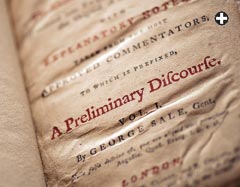 |
|
|
These attitudes again came into conflict
with Jefferson's vision in 1788, when the states voted to ratify the United States Constitution.
One of the matters at issue was the
provision—now Article vi, Section 3—that
"no religious Test shall ever be required as
a Qualification to any Office or public Trust
under the United States." Some Anti-Federalists
singled out and opposed this ban on
religious discrimination by painting a hypothetical
scenario in which a Muslim could
become president. On the other side of the
argument, despite their frequent opposition
to Jefferson on other matters, the Federalists
praised and drew on Jefferson's vision of
religious tolerance in supporting uncircumscribed
rights both to faith and to elected
office for all citizens. As the historian Denise
Spellberg shows in her examination of this
dispute among delegates in North Carolina,
in the course of these constitutional debates "Muslims became symbolically
embroiled in the definition of what it meant to be American citizens."
It is intriguing to think that Jefferson's study of the
Qur'an may have inoculated him—to a degree that
today we can only surmise— ainst such popular prejudices
about Islam, and it may have informed his conviction
that Muslims, no less and no more than any other
religious group, were entitled to all the legal rights
his new nation could offer. And although Jefferson was
an early and vocal proponent of going to war
against the Barbary states over their attacks
on us shipping, he never framed his arguments
for doing so in religious terms, sticking
firmly to a position of political principle. Far
from reading the Qur'an to better understand
the mindset of his adversaries, it is likely that
his earlier knowledge of it confirmed his
analysis that the roots of the Barbary conflict
were economic, not religious.
Sale's Koran remained the best available
English version of the Qur'an for another 150
years. Today, along with the original copy of
Jefferson's Qur'an, the Library of Congress
holds nearly one million printed items relating
to Islam—a vast collection of knowledge
for every new generation of lawmakers and
citizens, with its roots in the law student's
leather-bound volumes. 
 |
Sebastian R. Prange
(s.prange@gmail.com) holds a doctorate in history from
the School of Oriental and African Studies at the University of London. He studies the
organization of Muslim trade networks in the pre-modern Indian Ocean, with a regional
focus on South India. |
 |
Aasil Ahmad
(www.aasilahmad.net) is a freelance photographer and photo
editor for Islamic Monthly magazine. He recently completed a project in Kashmir teaching
photography to children impacted by the 2005 earthquake. His photos of the Hajj were
featured in a series called "A Minox in Mecca" at the Contact Photography Festival in
Toronto. He lives in Washington, D.C.
|